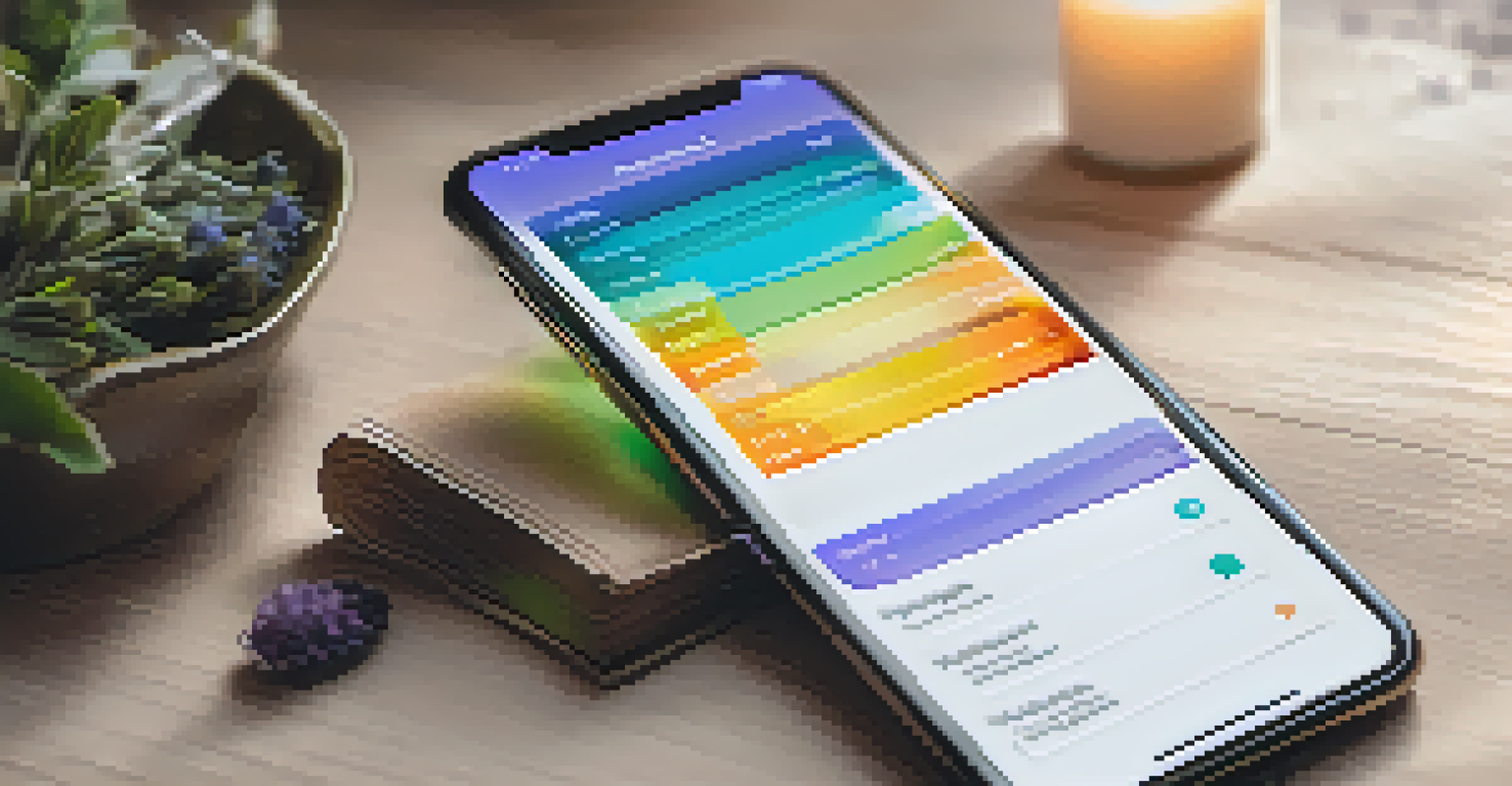Mental Health Apps: Revolutionizing Emotional Well-being

Understanding the Rise of Mental Health Apps
In recent years, mental health apps have surged in popularity, providing accessible resources for emotional well-being. With more people prioritizing mental health, these apps offer a modern solution to traditional therapy. They bridge the gap between professional support and self-care, making mental health resources available at our fingertips.
Mental health needs a great deal of attention. It's the final taboo and it needs to be faced and dealt with.
The convenience of mental health apps means you can access support anytime, anywhere. Whether it's a quick meditation session during lunch or journaling before bed, these tools fit seamlessly into busy lives. This flexibility allows users to integrate mental health practices into their daily routines.
Moreover, mental health apps cater to a diverse audience, with options for different age groups and needs. From anxiety and depression management to mindfulness and sleep improvement, there's an app for everyone. This personalization enhances user engagement and effectiveness.
Features That Make Mental Health Apps Effective
Many mental health apps include features like guided meditations, mood tracking, and educational resources. These tools not only provide immediate support but also encourage users to develop healthy habits. For instance, mood tracking can help individuals identify patterns and triggers in their emotional states.

Additionally, gamification elements in some apps encourage users to stay engaged. By completing tasks and earning rewards, users feel a sense of accomplishment, which can boost motivation. This playful approach makes mental health management feel less daunting and more enjoyable.
Accessibility of Mental Health Apps
Mental health apps provide a cost-effective alternative to traditional therapy, making support more widely available.
Furthermore, some apps offer community support through forums or group chats, creating a sense of belonging. Connecting with others who share similar experiences can alleviate feelings of isolation. This social aspect can be particularly beneficial for those who may feel uncomfortable seeking help in traditional settings.
Accessibility: Breaking Barriers to Mental Health Care
One of the most significant advantages of mental health apps is their accessibility. They provide a cost-effective alternative to traditional therapy, making mental health support available to a wider audience. This democratization of mental health care is crucial, especially for individuals in underserved communities.
The greatest weapon against stress is our ability to choose one thought over another.
With many apps offering free versions or low-cost subscriptions, financial barriers are reduced. This allows users to explore resources without the pressure of expensive sessions. As a result, more people are empowered to take charge of their mental health without feeling overwhelmed by costs.
Moreover, for those who may find in-person therapy intimidating, apps serve as a comfortable entry point. Users can engage with mental health resources privately and at their own pace. This gradual approach can lead to increased willingness to seek further help if needed.
Personalization: Tailoring Mental Health Support
Personalization is a key feature of many mental health apps, allowing users to customize their experience. Users can select specific goals, such as stress reduction or relationship support, which tailors the content to their needs. This targeted approach enhances engagement and effectiveness.
Some apps even use algorithms to recommend activities based on user behavior and preferences. For example, if a user frequently engages with anxiety-related content, the app may suggest similar resources or exercises. This level of customization fosters a deeper connection with the material.
Personalization Enhances Engagement
Many mental health apps allow users to customize their experience, tailoring content to individual needs for better effectiveness.
Moreover, the ability to track progress over time allows users to see their growth. Many apps provide insights into mood trends and coping strategies that work best for individuals. This feedback loop encourages users to stay committed to their mental health journey.
The Role of Technology in Mental Health Management
Technology plays a crucial role in the development of mental health apps, enabling innovative features and user-friendly interfaces. The integration of AI and machine learning helps create more responsive and adaptive platforms. This technological advancement allows apps to evolve alongside user needs.
Additionally, virtual reality (VR) is emerging as a tool within mental health apps, offering immersive experiences for relaxation and exposure therapy. For example, users can practice mindfulness in a calming virtual environment, which can enhance the overall effectiveness of the practice.
As technology continues to advance, we can expect even more sophisticated tools for mental health management. The potential for real-time support through chatbots or AI-driven therapy sessions could revolutionize how we approach emotional well-being.
Challenges and Limitations of Mental Health Apps
While mental health apps offer numerous benefits, they are not without challenges. One major concern is the quality of content, as not all apps are created equally. Users must be discerning, as poorly designed apps can do more harm than good by providing inaccurate or misleading information.
Another limitation is the lack of personalized support that comes from professional therapists. While apps can provide valuable resources, they cannot replace the nuanced understanding that a trained professional offers. This distinction is crucial for individuals with more severe mental health issues who may need intensive care.
Technology's Role in Support
Advancements in technology, such as AI and VR, are transforming mental health apps into more responsive and engaging tools.
Finally, privacy and data security are significant concerns. Users must trust that their personal information is protected, especially when discussing sensitive topics. Developers need to prioritize transparent data practices to build this trust and ensure user safety.
The Future of Mental Health Apps: Trends to Watch
As mental health awareness continues to grow, the future of mental health apps looks promising. We can expect to see increased integration of teletherapy features, allowing users to connect with professionals directly through the app. This hybrid approach combines the benefits of technology with traditional therapy.
Additionally, the incorporation of more interactive and engaging content, such as video sessions and live workshops, will likely enhance user experience. These features can make mental health practices feel more accessible and relatable, breaking down barriers to engagement.

Finally, as the conversation around mental health evolves, apps will continue to adapt to meet the changing needs of users. By staying attuned to user feedback and emerging research, developers can create solutions that genuinely support emotional well-being in an ever-changing world.